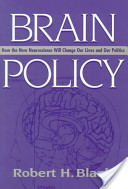Beware of those who have a policy agenda for your brain
 To infer in any way that our brain does not belong to us, and may be subject to rules and policies set forth by others, raises immediate threats of personal invasion.
To infer in any way that our brain does not belong to us, and may be subject to rules and policies set forth by others, raises immediate threats of personal invasion.
However, we already accept some forms of brain intrusion with professional guidelines and policies that are already in place.
We allow psychiatrists and psychologists to diagnose brain based personality and behavioral disorders and accept their professional judgments as being of sound mind, mentally competent, mentally deficient or with diminished faculties. We allow researchers and medical personnel to scan our brains for brain trauma, tumors, strokes, brain diseases and brain deterioration. We also let them monitor our brain waves for sleep disorders, meditation and varied states of brain performance. And ultimately, we let them determine if we are brain dead.
Just as genetics and organ transplants have taken on governing boards and policy directives at state and federal levels, so too Professor Richard H. Blank of the department of political science at the University of Canterbury, New Zealand, suggests the same as a result of advances in neuroscience.
In 1997, professor Blank authored Brain Policy: How the new neuroscience will change our lives and our politics. Blank proposes as advances in brain technology continue there will be both positive advances and abuses which will fundamentally challenge our overall sense of
- Equality
- Autonomy
- Freedom
- Responsibility
- Human nature
According to Robert Cook-Deegan, M.D. and senior program officer at the National Academy of Sciences, Blank raises ethical and social issues of “… violence, addiction, gender differences in brain structure and function, and sexual orientation. … [and] how knowledge of brain mechanisms influences legal and moral conceptions of free will and responsibility.”
However, by 2012 brain policy now has a much broader neuroscience perspective. The University of California, Hastings College of the Law sponsored a strategic conference on Law and Policy of the Developing Brain: Neuroscience from Womb to Death.
“The theme of the conference revolves around the law and policy surrounding the developing brain. … The panels and speakers over the two days of the conference will consider law and neuroscience issues as they arise throughout the human lifespan, beginning … with prenatal and infant brains, and ending … with the neuroscience of aging and death.”
No longer are we looking solely at the dysfunctional or diseased brain, but attention is now directed to policies affecting the development and life span of the brain itself.
Why would this be of concern to you?
If you once thought that all things reproductive were rights that belong to you, you now realize that various states are legislating various forms of preemptive reproductive control.
As Leon Kass, a controversial, physician and scientists who has publically questioned areas of embryo research, opposed human cloning and euthanasia and served on the President’s Council on Bioethics as chairman from 2001 to 2005, warns – “Limits have to be set on how far one can simply use the… cleverness that we have to make changes.”
While scientific advances that improve the quality of brain health are welcomed, at the same time we must be aware and limit the brain policy intrusions we find unacceptable. If not someone will legislate a brain policy for us.
Sources:
http://www.dana.org/printerfriendly.aspx?id=2230
http://press.georgetown.edu/book/georgetown/brain-policy#toc
http://www.uchastings.edu/media-and-news/event/2012/02/lawneuro.html
Photo Credit: books.google.com